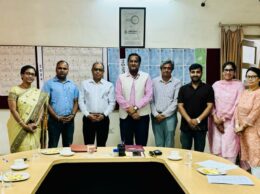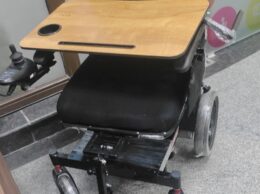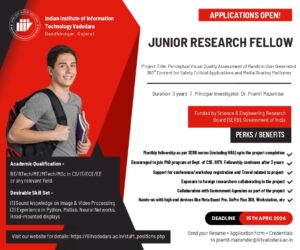Chennai: Indian Institute of Technology (IIT) Madras is partnering with the European Union on a novel concept in Technical Education for Developing Countries called ‘Dual Education’.
This concept merges the classroom learning with industrial experiences. It envisages students spending considerable time employed in Industry as full-time workers, rather than interns, as part of their Curriculum. This will expose students to real-time developments and the technological needs of the industry.
The TEEDE (Towards Excellence in Engineering Curricula for Dual Education), a European Union and ‘Erasmus +’-funded consortium of eminent Universities in Europe and Asia, is working to take this model to the Developing Countries. It has selected Prof. Rajesh Nair, Associate Professor (Petroleum Engineering), Department of Ocean Engineering, IIT Madras, to be the coordinator for this project at IIT Madras.
A three-day brainstorming session began at IIT Madras today (30th November 2017) with delegates from universities in India, Russia, Europe and Asia taking part.
Delivering the inaugural address, Prof. R. Nagarajan, Dean (International and Alumni Affairs), IIT Madras, said, “Internationalization and industry relations are two of the biggest priorities for IIT Madras, and this initiative brings them together in the most effective way. We are proud to partner with EU on this pioneering effort.”
The partners of this TEEDE consortium are eminent universities in Russia, Italy, Germany, Cambodia, India, China, Finland, Belgium and Spain who are all attending this Termly Meeting. The expected outcome is formulating an Upgraded Curricula for Engineering Education in Developing Countries based on economic needs of respective countries.
The three-day meet features several interactive sessions where delegates from different countries will provide inputs on methodological guidelines of professions and qualifications.
Speaking on the occasion, Prof. Laureano Jiménez Esteller, Principal Coordinator for TEEDE, and Professor in Universitat Rovira i Virgili (URV), Tarragona, Spain, said, “The project started in October 2016, so it has been running for more than a year now, and the aspects of running such a diverse group have been solved. In fact, this is the second project meeting and the fourth project activity that indicates that the project is in line with the proposal and that, in general, the consortium has been able to achieve most of the objectives planned in the proposal.”
Further, Prof. Laureano Jiménez Esteller said, “The final aim is that dual programmes are developed in the partner countries, as this approach goes a step beyond classical Academia-Enterprise collaboration.”
Speaking about this initiative, Prof. Rajesh Nair said “What makes Dual Education unique is that it narrows the gap between the industry requirements and the curriculum. As an example, for the Doctoral Research Programs (Ph.D.), there’ll be two Guides – one each from Industry and Academia.”
“The purpose of TEEDE Grant is to add industrial component to the curriculum, thereby upgrading the same, improving the employability, professional edge and ensuring career enhancement,” added Prof. Rajesh Nair.







